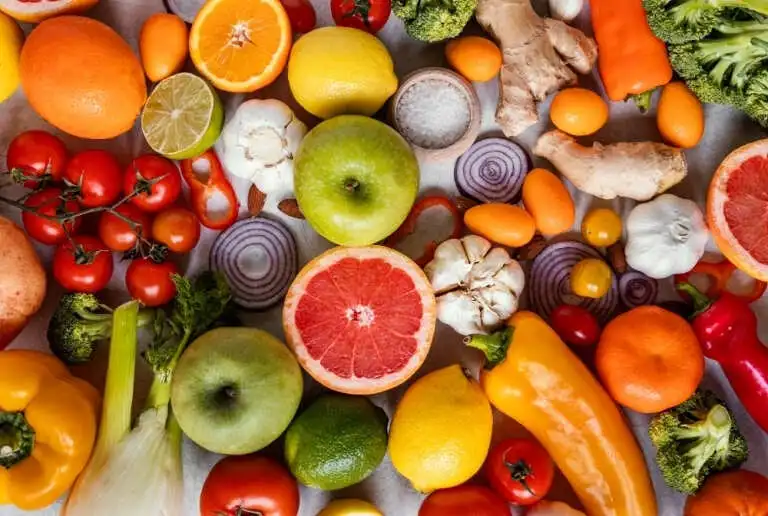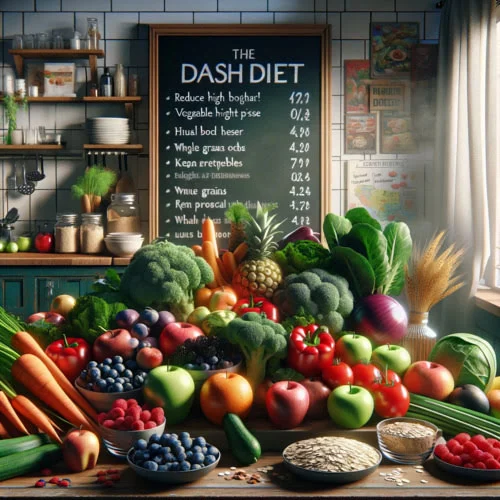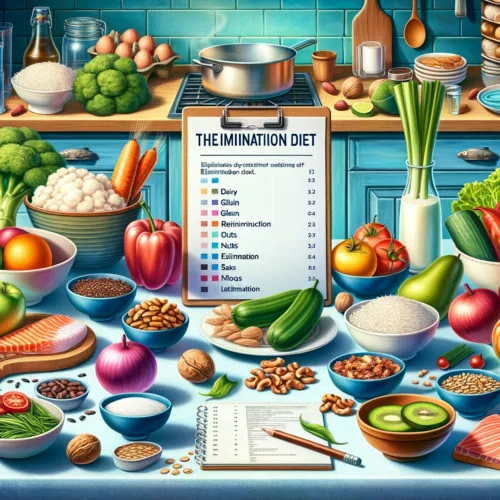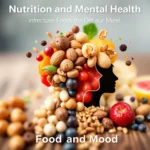Plant-based nutrition is becoming increasingly popular among individuals seeking a healthier lifestyle and improved dietary habits. The shift away from meat towards a plant-based diet can bring numerous health benefits and positively impact the environment. However, many people wonder how to balance their diet without meat and ensure they get all the necessary nutrients. In this article, we will explore the fundamentals of plant-based nutrition, provide recommendations for creating a balanced diet, and highlight the advantages of embracing this dietary lifestyle. Get ready to discover new flavors and learn about the opportunities that plant-based nutrition offers for your health and well-being.
Plant-based nutrition offers a multitude of advantages that make it an appealing choice for a healthy lifestyle. Firstly, it is rich in dietary fiber, promoting digestive regularity and supporting a healthy gut microbiome. Additionally, a plant-based diet typically contains lower levels of saturated fats and cholesterol, helping reduce the risk of cardiovascular diseases. It also provides ample intake of vitamins, minerals, and antioxidants, playing a crucial role in maintaining the immune system and protecting the body from harmful free radicals. Moreover, plant-based nutrition can be a more environmentally sustainable choice, contributing to the reduction of negative impacts on the environment. This dietary approach presents numerous compelling reasons to embrace it and construct a well-balanced meat-free diet.
Plant-Based Nutrition: Fundamentals

Plant-based nutrition is centered around the consumption of a diverse range of plant-derived products, including vegetables, fruits, grains, legumes, nuts, and seeds. The key principle of plant-based nutrition involves increasing the intake of nutrient-rich foods while reducing the consumption of animal products.
When choosing plant-based products, it’s essential to focus on their variety to ensure the intake of all necessary nutrients. Vegetables and fruits offer a wide range of vitamins and minerals, while grains, legumes, nuts, and seeds provide proteins, fats, B vitamins, and other vital nutrients.
Plant-based nutrition also allows for experimentation with different culinary techniques and seasonings to create delicious and diverse dishes. It can be an inspiring and creative process, enabling you to discover new flavors and textures.
By following the basics of plant-based nutrition, you can establish a balanced, meat-free diet that provides all the necessary nutrients for maintaining health and well-being.
Key Nutrients in a Plant-Based Diet
Plant-based nutrition offers a broad spectrum of nutrients essential for maintaining health and well-being. With a balanced approach to plant-based eating, you can obtain all the key nutrients.
1. Protein: In a plant-based diet, protein can be obtained from legumes, soy, nuts, seeds, and grains. It’s crucial to include diverse sources of plant-based protein to ensure the intake of all essential amino acids.
2. Iron: Plant-based iron sources include spinach, broccoli, dark leafy greens, peas, beans, quinoa, and nuts. To enhance iron absorption, it’s recommended to consume it with vitamin C-rich foods, such as citrus fruits.
3. Calcium: Plant-based calcium sources include broccoli, cabbage, dark leafy greens, almonds, dates, and some tofu varieties. Additionally, fortified plant-based milk alternatives can be a good source of calcium.
4. Omega-3 Fatty Acids: Flaxseeds, chia seeds, walnuts, and some other plant-based products are sources of omega-3 fatty acids, essential for heart and brain health.
5. Vitamin B12: In a plant-based diet, vitamin B12 is primarily found in fortified products like plant-based milk and breakfast cereals, B12-fortified nutritional yeast, and supplements. It’s crucial to pay attention to ensuring an adequate intake of vitamin B12 in plant-based eating.
With a balanced approach, plant-based nutrition can provide all the necessary nutrients to support a healthy and wholesome meat-free diet.
Proteins
Proteins are a crucial element of plant-based nutrition, necessary for growth, recovery, and maintaining healthy tissues in the body. Plant sources of protein, such as legumes, soy, nuts, seeds, and grains, contain all the essential amino acids but in different combinations and concentrations. Including a variety of plant-based protein sources in the diet ensures that the body receives all the necessary amino acids. For example, soy provides a complete set of amino acids and is considered one of the best plant-based protein sources. Legumes and peas are also excellent protein sources, while nuts and seeds add an additional amount of protein to the diet. Plant proteins are healthy and easily digestible, rich in fiber and other beneficial nutrients, making them an excellent choice for a balanced meat-free diet.
Fats
Fats are an integral part of plant-based nutrition and are essential for many functions in the body. Plant fat sources such as olive oil, avocado, nuts, and seeds provide beneficial unsaturated fats, including omega-3 and omega-6 fatty acids. These fatty acids play a key role in maintaining heart, brain, and vascular health. They also help improve the absorption of fat-soluble vitamins such as vitamin A, D, E, and K. It is important to include a variety of plant-based fat sources in the diet to ensure an adequate intake of these beneficial nutrients.
Vitamins and Minerals
Plant-based nutrition provides the body with a wide range of vitamins and minerals necessary for maintaining health. Fruits, vegetables, greens, berries, nuts, seeds, and grains are rich sources of vitamins A, C, E, and K, as well as various B vitamins. They also contain essential minerals such as iron, calcium, magnesium, zinc, and many others. For example, green vegetables like spinach and broccoli are rich in vitamin K and calcium, contributing to bone health. Citrus fruits provide ample vitamin C, essential for the immune system and healthy skin. Consuming a variety of plant-based products allows for the intake of all necessary vitamins and minerals to support optimal health and well-being.
Plant Sources of Nutrients
Plant-based nutrition offers a wide selection of nutrient-rich sources, contributing to a balanced meat-free diet. Fruits and vegetables form the foundation of a plant-based diet, offering a multitude of vitamins, minerals, and antioxidants. Berries and vitamin C-rich fruits like oranges and strawberries enrich the diet with antioxidants, supporting a healthy immune system. Grains, such as oats and quinoa, provide excellent sources of fiber, protein, and complex carbohydrates. Nuts and seeds are rich in healthy fats, protein, and micronutrients. Legumes, including beans, chickpeas, and lentils, offer plant-based protein, iron, and other nutrients. Incorporating these plant-based sources into the diet helps ensure an adequate intake of nutrients, supporting overall health.
Protein Sources
Plant-based nutrition provides diverse protein sources that can replace animal products. One of the most popular protein sources for vegetarians and vegans is legumes, including beans, chickpeas, lentils, and peas. They contain high levels of protein and essential nutrients such as iron and zinc. Tofu, soy, and other soy products are also excellent sources of plant-based protein. Nuts, seeds, as well as quinoa and buckwheat, contain significant amounts of protein and can be included as additional sources. Combining various protein-rich foods helps ensure a complete and balanced diet without the need for meat.
Sources of Healthy Fats
Plant-based nutrition offers a wide variety of healthy fats necessary for proper body functioning. One of the main sources of beneficial fats is nuts and seeds, such as almonds, walnuts, flaxseeds, and chia seeds. They are rich in polyunsaturated fatty acids, including omega-3 and omega-6, crucial for heart and brain health. Avocado is also an excellent source of healthy fats, containing monounsaturated fatty acids. Olives, olive oil, and peanut oil can be included in the diet to add healthy fats. It is important to remember that even in plant-based fat sources, moderate consumption is necessary to maintain a balanced diet.
Nutrient-Rich Foods
Plant-based nutrition provides an extensive selection of nutrient-rich foods that play a vital role in maintaining health and well-being. Fruits and vegetables are primary sources of many vitamins and minerals, such as vitamin C, vitamin A, folates, potassium, and magnesium. For example, citrus fruits, berries, kiwi, red and yellow bell peppers are rich in vitamin C, contributing to immune system strength and healthy skin. Green vegetables, including spinach, cabbage, broccoli, and kale, are abundant in vitamin K, essential for bone health. Nuts and seeds, such as walnut, almond, sunflower seeds, and sesame, offer a variety of vitamins, minerals, and antioxidants, supporting overall health. Adding a diverse range of fruits, vegetables, nuts, and seeds to your diet helps ensure the body receives all the necessary nutrients.
Plant-Based Nutrition — Balanced Diet

Creating a balanced diet in plant-based nutrition plays a crucial role in providing the body with all the necessary nutrients. It’s important to consider the diversity of products and their nutritional components to ensure an adequate intake of protein, fats, vitamins, minerals, and other essential elements. Including various protein sources such as legumes, soy products, nuts, and seeds ensures that the body receives all the essential amino acids. This variety helps in meeting protein needs while following a plant-based diet. For healthy fats, plant oils, avocados, nuts, and seeds can be used. Additionally, incorporating a variety of fruits, vegetables, greens, whole grains, and legumes into the diet provides sufficient vitamins, minerals, and fiber. When planning a plant-based diet, consulting with a dietitian is recommended to guarantee nutritional diversity and balance.
Combining Products
The combination of products in a plant-based diet plays a crucial role in ensuring comprehensive nutrition. Some food components interact with each other, enhancing absorption and increasing nutritional value. For example, combining vitamin C-rich products (such as citrus fruits, kiwi, and berries) with iron-containing products (like legumes, nuts, and greens) facilitates better iron absorption. Similarly, pairing products high in fat-soluble vitamins (e.g., vitamin E found in nuts and seeds) with items rich in healthy fats (such as avocado or olive oil) aids the body in absorbing these vitamins. Experimenting with different product combinations ensures optimal nutritional diversity and maximizes the benefits of a plant-based diet.
Planning Protein Sources
When creating a balanced plant-based diet, it’s crucial to ensure an adequate intake of protein. Proteins are essential building blocks for our bodies, necessary for maintaining healthy muscles, tissues, and cells. Plant-based products like legumes (e.g., beans, chickpeas, lentils), tofu, soy, and peas are excellent sources of plant-based protein. Planning a diet with diverse protein sources ensures a complete spectrum of amino acids necessary for normal body functioning. Combining different products, such as pairing legumes with grains (like rice, wheat, oats) or tofu with vegetables, helps achieve the required protein intake.
Meeting Fat Needs
Fats are an essential component of the diet, necessary for proper body functioning. When planning a plant-based diet, it’s essential to choose healthy fat sources that satisfy the body’s needs. Good plant-based sources of healthy fats include nuts, seeds, avocado, and plant oils such as olive oil and coconut oil. These sources contain beneficial unsaturated fats, including omega-3 and omega-6 fatty acids, crucial for heart and vascular health. While planning the diet, aim to include diverse fat sources to obtain the necessary variety and balance of fatty acids.
Distribution of Vitamins and Minerals
Vitamins and minerals are integral parts of a healthy diet, performing several vital functions in the body. When creating a balanced meat-free diet, it’s crucial to pay attention to the distribution of different vitamins and minerals. Plant-based products can be rich in various vitamins and minerals, but some may be less accessible or require specific attention.
For example, iron is an essential mineral found in nuts, green vegetables, legumes, and whole grains. However, the body absorbs iron better when consumed in combination with vitamin C. Therefore, it’s important to include vitamin C-rich products, such as citrus fruits, kiwi, papaya, and tomatoes, in the diet.
Calcium, another crucial mineral, can be obtained from plant sources like broccoli, dark green vegetables, tofu, and almonds. However, the body also needs an adequate amount of vitamin D to absorb calcium. Vitamin D can be obtained from products enriched with this vitamin or through exposure to sunlight. Paying attention to these combinations ensures the body’s optimal utilization of nutrients in a plant-based diet.
Practical Tips for Preparing and Consuming Plant-Based Meals
When transitioning to a plant-based diet and maintaining a balanced meat-free diet, there are several practical tips that can help you derive maximum benefits from your food:
1. Diversify Your Diet: Incorporate a wide range of plant-based foods, including fruits, vegetables, greens, legumes, nuts, seeds, and whole grains. This ensures a variety of essential nutrients.
2. Cook Fresh, Homemade Meals: Preparing your own meals allows you to control the composition and quality of ingredients. Use fresh produce and avoid processed or packaged foods.
3. Experiment with Flavors and Textures: Explore various cooking methods and ingredient combinations to make your meals interesting and flavorful. Try frying, boiling, baking, steaming, or adding fresh herbs and spices.
4. Pay Attention to Nutrient Sources: Identify plant-based foods rich in protein, fats, vitamins, and minerals. Include a variety of these sources in your diet and ensure a diversity of nutrients.
5. Consume Food Mindfully: Avoid rushing through meals; savor and enjoy your food. Pay attention to feelings of fullness and satisfaction. Proper chewing and mindful eating help maximize the benefits of your meals.
By following these practical tips, you can seamlessly integrate plant-based nutrition into your daily life, maintaining a balanced diet without meat while relishing delicious and nutritious food.
Recipes and Ideas for Balanced Plant-Based Dishes

When opting for a plant-based diet and aiming to balance your meat-free meals, it’s crucial to have a variety of tasty and nutritious dishes. Here are some ideas and recipes to help you create balanced plant-based meals:
- – Green Salads: Include a variety of vegetables, greens, and protein sources like tofu, chickpeas, or quinoa.
- – Buddha Bowls: Combine roasted vegetables, whole grains, legumes, and flavorful nut or avocado-based sauces.
- – Tacos with Tempeh or Soy Crumbles: Use alternatives like tempeh or soy-based crumbles with fresh vegetables, salsa, and guacamole.
- – Creamy Vegetable Soups: Utilize vegetables such as broccoli, pumpkin, or spinach, with coconut milk or cashews for richness.
- – Vegan Burgers: Craft burgers using vegetables, mushrooms, or quinoa, with mustard or avocado-based sauces and fresh toppings.
- – Pasta with Tomato, Avocado, or Nut-Based Sauces: Incorporate vegetables and herbs for enhanced flavor.
- – Baked Vegetables with Aromatic Spices: Use turmeric, cumin, and paprika for added richness and variety.
These are just a few examples; feel free to experiment with different products, combinations, and cooking methods to enrich your diet and meet all your nutritional needs.
Meal Organization and Menu Planning
Meal organization and menu planning are vital aspects of maintaining a balanced plant-based diet. Here are practical tips to assist you:
1. Plan Ahead: Determine the days you’ll cook and plan your weekly menu. Create a shopping list and make purchases in advance.
2. Diverse Food Choices: Aim for a variety of vegetables, fruits, nuts, seeds, whole grains, legumes, and other plant-based products to ensure a broad spectrum of nutrients.
Protein Distribution
Ensure your diet includes an adequate amount of protein from various sources such as tofu, chickpeas, lentils, soy products, nuts, and seeds.
Incorporate Healthy Fats
Add sources of healthy fats to your diet, including avocado, olive oil, nuts, and seeds. They enhance both the taste and absorption of nutrients.
Balanced Cooking
Balanced cooking is essential for preserving nutrients. Avoid overcooking vegetables to retain their nutritional value. Opt for cooking methods like steaming, boiling, or baking to maintain vitamins and minerals.
Meal Splitting
Divide your daily meals into several smaller ones. This helps maintain a consistent energy level and ensures better nutrient absorption.
Moderation in Consumption
Monitor your portions and consume food moderately. Plant-based diets can be rich in carbohydrates, so control your carb intake, especially if you have specific dietary requirements or goals.
Variety in Meals
Experiment with different recipes and cooking methods. Include a variety of vegetables and fruits in your meals to obtain diverse nutrients.
Consider Individual Needs
Take into account your individual needs and body characteristics. If you have any dietary restrictions or allergies, consult a dietitian or doctor for personalized recommendations.
Regular Monitoring
Pay close attention to your well-being and results. If you feel adjustments are needed in your diet, discuss them with a healthcare professional.
Health and Well-being
By following these practical tips, you can balance your meat-free diet and enjoy a fulfilling plant-based nutrition. This will help you obtain all necessary nutrients and maintain a healthy lifestyle.
Health and Well-being are crucial aspects of our lives, and proper plant-based nutrition can play a significant role in supporting them. Recent research indicates that plant-based diets can reduce the risk of developing cardiovascular diseases, obesity, diabetes, and certain types of cancer. Rich in dietary fiber, antioxidants, vitamins, and minerals, plant-based foods help strengthen the immune system, improve digestion, reduce inflammation, and boost overall energy levels. Plant-based nutrition also contributes to maintaining a healthy weight and can be beneficial for appetite control and lowering the risk of chronic diseases. Incorporating plant-based products into your diet and maintaining a balanced meat-free diet can help achieve optimal health and well-being.
Reducing the Risk of Cardiovascular Diseases
Reducing the risk of cardiovascular diseases is one of the significant benefits of a plant-based diet. Fruits, vegetables, whole grains, nuts, and seeds, rich in dietary fiber, antioxidants, and healthy fats, help lower cholesterol levels and reduce blood pressure. Regular consumption of plant-based foods is also associated with improved vascular function, reduced inflammation, and maintaining a healthy cardiovascular system. Including plant-based protein sources, such as legumes, soy products, and nuts, can help replace some animal products and reduce the intake of saturated fats, positively impacting cardiovascular health.
Plant-Based Nutrition for Weight Support and Appetite Control
Plant-based nutrition can be a valuable tool in supporting a healthy weight and controlling appetite. Most plant-based products are low in calories, high in dietary fiber, and water content, promoting a feeling of fullness for an extended period. Fiber-rich vegetables, fruits, and whole grains help regulate blood sugar levels, preventing sharp glucose spikes and controlling the desire to snack. Plant-based products also contain fewer saturated fats, contributing to a reduced risk of gaining excess weight. Combining diverse plant-based products, including protein sources, healthy fats, and carbohydrates, allows for the creation of a balanced diet that supports a healthy weight and appetite control.
Strengthening the Immune System
Plant-based nutrition plays a crucial role in strengthening the immune system. Many fruits, vegetables, berries, and whole grains contain a broad spectrum of vitamins, minerals, and antioxidants that support immune system health. For example, vitamin C, found in citrus fruits, kiwi, and berries, helps enhance resistance to infections. Beta-carotene, present in orange vegetables and green leafy vegetables, contributes to immune system strength. Additionally, plant-based nutrition is typically rich in dietary fiber, supporting a healthy gut microbiota and overall immune system function. Properly balanced and plant-based nutrition can significantly elevate the body’s defense mechanisms and boost immunity.
Conclusion
In conclusion, plant-based nutrition represents a healthy and balanced approach to eating, providing all necessary nutrients without the need for meat consumption. It is rich in vitamins, minerals, antioxidants, and dietary fiber, contributing to overall well-being. A well-constructed plant-based diet can help reduce the risk of various diseases, control weight, improve digestion, strengthen the immune system, and increase energy levels. It’s essential to choose diverse products and pay attention to individual dietary needs. Consulting with a dietitian or doctor can help develop a personalized plant-based nutrition plan that suits your requirements. Remember, balanced plant-based nutrition can be not only delicious but also beneficial for your health and well-being.















